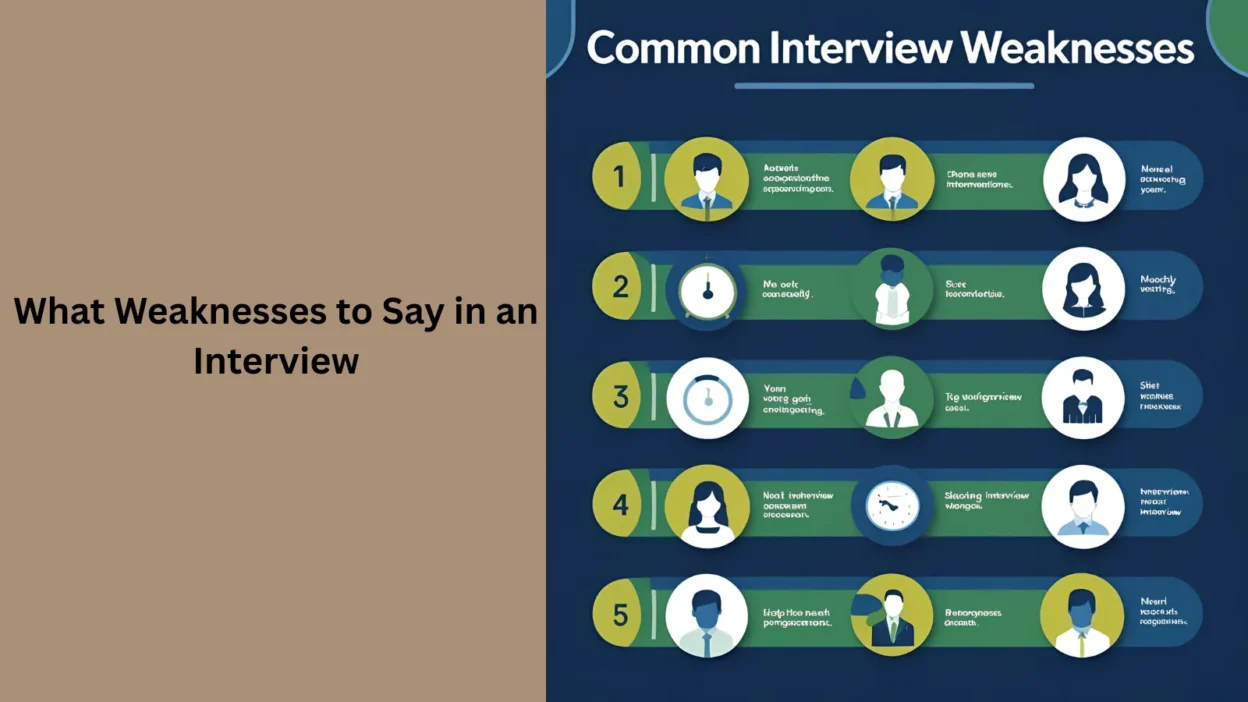You’re feeling good, answering questions confidently in your job interview—then it happens. The hiring manager leans in and asks, “What’s your biggest weakness?” 😅
It’s one of the most dreaded questions out there. But here’s the good news: knowing what weaknesses to say in an interview—and how to say them—can help you shine. This question isn’t meant to trip you up. It’s a chance to show you’re honest, self-aware, and always improving.
In this article, we’ll show you how to pick the right weaknesses, talk about them with confidence, and turn a tricky moment into a powerful one. Let’s get started.
Why Do Interviewers Ask About Weaknesses?
It’s Not a Trick—It’s a Test of Honesty
When interviewers ask about your weaknesses, they’re not looking to catch you off guard. They’re checking to see how you handle self-reflection and feedback.
They want to know:
- Do you recognize areas where you can grow?
- Are you honest about your challenges?
- Can you improve over time?
Being real about a weakness shows maturity and confidence.
They Want to See Self-Awareness and Growth
Nobody is perfect. What matters is how you deal with your imperfections. If you show that you understand your weakness and are taking steps to improve, it makes a great impression.
Example:
❌ “I don’t have any weaknesses.”
✅ “I used to struggle with time management, but now I use a planner and set reminders.”
What Weaknesses Are Safe to Mention in an Interview?
Choose a Real but Role-Friendly Weakness
Pick something that’s true—but not a dealbreaker for the job.
Some safe examples:
- “I sometimes take on too much because I don’t like to say no.”
- “I used to get nervous speaking in front of groups.”
- “I can be a bit of a perfectionist and spend extra time on tasks.”
These types of weaknesses are common, understandable, and fixable.
Always Share What You’re Doing to Improve
The key is to show growth. Talk about how you’ve worked to improve your weakness.
Example:
✅ “I used to be nervous in team meetings. So I started joining small group discussions, and now I speak up more.”
This tells the interviewer: “I’m growing, and I care about doing better.”
What Weaknesses to Avoid Saying in an Interview
Red Flag Weaknesses That Can Hurt Your Chances
Be careful! Some weaknesses may raise concerns about how you’d perform in the role.
Avoid saying things like:
- “I’m often late.”
- “I have trouble meeting deadlines.”
- “I don’t like working with others.”
These could signal you’re not a good fit for the job.
Avoid “Fake” Weaknesses That Sound Like Bragging
Many people try to give a “strength” disguised as a weakness. It sounds fake and doesn’t help you.
❌ “I work too hard.”
❌ “I care too much.”
❌ “I’m just too perfect sometimes.”
Instead, be honest. Pick a real challenge and show how you’re improving.
How to Talk About Your Weakness (Step-by-Step)
Use This Simple 3-Part Formula
Here’s a great way to answer the question:
- Say what your weakness is (briefly).
- Give a quick example or story.
- Explain what you’re doing to improve.
Example:
✅ “I used to struggle with giving feedback. I worried it might upset people. But I’ve learned that kind, helpful feedback is valuable. Now I use clear examples and always stay positive.”
End on a Positive, Growth-Focused Note
Always finish by showing progress. This turns your weakness into a strength.
Think of it like this:
❌ Weakness → 🚧 Ongoing Work → ✅ Stronger You
Sample Answers
For Office & Admin Roles
“I can be overly detailed, which used to slow me down. But I’ve learned to prioritize and focus on what’s most important.”
For Tech or Developer Jobs
“I didn’t always ask for help when stuck on a problem. Now, I check in with my team earlier and work through things faster.”
For Customer Service or Retail
“I used to get flustered with upset customers. After some training and practice, I stay calm and listen better.”
For Creative or Writing Roles
“I sometimes second-guess my work. Now I stick to deadlines and trust my first drafts more, then revise with fresh eyes.”
These examples show you’re real—and that you’re growing.
How Many Weaknesses Should You Mention in an Interview?
Stick to One Strong, Honest Example
Usually, one is enough. A thoughtful, well-explained weakness with growth is better than a list of problems.
If the interviewer asks for more, have a second one ready. Just make sure it follows the same pattern: real, but not harmful to the job.
Be Ready with a Second If Asked
A second example could be:
“I sometimes overthink decisions, but I’ve learned to set time limits and trust my instincts more.”
Be confident, not apologetic. Everyone has something they’re working on.
Final Thoughts
Now that you know what weaknesses to say in an interview, you can turn a tough question into a great opportunity.
Pick something honest, keep it light, and always show how you’re improving.




